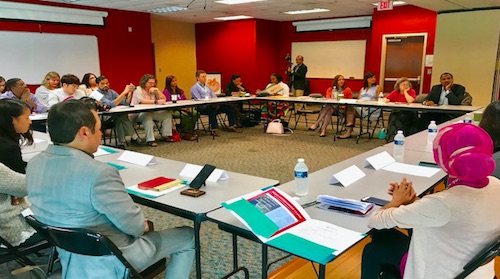In a collaborative effort with Ethnic Media Services (EMS), the Federal Trade Commission (FTC) orchestrated an enlightening EMS briefing, unraveling critical insights into the pervasive issue of fraud in the United States. The event, co-hosted by the FTC and ethnic media services, served as a platform to raise awareness and fortify consumer protection initiatives. Maria Mayo, Acting Associate Director for the Division of Consumer Response and Operations, took the stage to unveil the highly anticipated 2023 data on nationwide fraud.
Mayo, entrusted with managing the extensive Consumer Sentinel Network, delved into key trends observed in the 2023 data, revealing a staggering $10 billion in reported losses to frauds and scams. This marked a substantial increase from the previous year, reflecting the evolving tactics employed by fraudsters. Despite a stable number of reports, one in four consumers reported monetary losses, emphasizing the financial impact on individuals. The top five fraud categories included imposters, online shopping, prizes, sweepstakes, lotteries, investments, and business/job opportunities.
The diversity of imposter scams, ranging from business and government impersonation to romance and tech support scams, was underscored by Mayo. A poignant example highlighted a business imposter scam where a consumer lost everything by falling victim to a fake US Marshal.
Government imposter fraud witnessed a notable surge, with median losses escalating to $7,000. Investment-related scams, while ranking fourth in reported cases, resulted in the highest losses, reaching $4.6 billion, with a median loss exceeding $7,000.
Mayo’s presentation extended to changes in contact methods, revealing that email surpassed text as the most reported method in 2023. However, phone calls initiated through social media led to higher median losses, highlighting the nuanced nature of scam initiation.
The discussion delved into payment methods, with consumers predominantly reporting the use of bank transfers and cryptocurrency, resulting in losses of $1.9 billion and $1.4 billion, respectively.
The $10 billion in reported fraud losses underscored the need for increased awareness and vigilance. The accompanying Sentinel Data Book, released alongside the briefing, offers comprehensive information on fraud reports and identity theft, emphasizing the pivotal role of consumer reporting in the FTC’s endeavors.
Following Maria Mayo’s impactful presentation, Lois Greisman, Associate Director of the Federal Trade Commission Division of Marketing Practices, provided deeper insights into the multifaceted approach employed by the FTC to combat evolving fraud tactics. Greisman emphasized the indispensable role of consumer reporting, serving as the backbone of the FTC’s initiatives.
The extensive dataset in the Consumer Sentinel database aids nearly 3,000 law enforcement entities nationwide in identifying and combating scams effectively. Greisman showcased real-life examples, such as the Ganodoras and BI MT cases, highlighting the FTC’s commitment to addressing scams targeting specific communities.
Transitioning to the discussion on impersonation scams, Greisman shed light on the alarming rise of scams utilizing artificial intelligence (AI) for voice cloning. This evolution poses challenges for future fraud detection, underlining the need for adaptive strategies in law enforcement and consumer protection.
The presentation delved into red flags for consumers, emphasizing payment instruments like wire transfers, gift cards, and cryptocurrencies. Scammers’ preference for these methods due to their anonymity presents significant challenges for law enforcement in tracing and recovering funds.
In response to questions from the audience, Greisman highlighted the unexpected prominence of text messaging in scams, reflecting changing communication preferences. Addressing the global landscape of fraud, she discussed challenges posed by scammers operating both offshore and domestically, showcasing the FTC’s international collaborations.
The comprehensive discussion with Maria Mayo and Lois Greisman underscored the complex and evolving nature of scams, emphasizing the need for a multi-faceted approach involving law enforcement, industry collaboration, and consumer education to effectively combat fraudulent activities. The insights shared during the briefing serve as a crucial resource for individuals and communities navigating the challenging landscape of consumer fraud.
Continuing the comprehensive briefing, Lois Greisman’s insights provided a deeper understanding of the Federal Trade Commission’s (FTC) multifaceted approach to combating evolving fraud tactics. Greisman emphasized the indispensable role of consumer reporting, which forms the backbone of the FTC’s initiatives for two primary reasons.
The vast repository of reports in the Consumer Sentinel database is a valuable resource available to nearly 3,000 law enforcement entities nationwide. This extensive dataset serves as a treasure trove of information, enabling law enforcement to identify and combat various scams effectively. By leveraging consumer reports, the FTC enhances its ability to stay ahead of fraudulent activities and protect consumers.
The data also aids in strategic planning and outreach initiatives. Greisman highlighted how analyzing patterns and trends in reported scams enables the FTC to proactively address emerging threats. For instance, if a surge in scams involving gift cards is identified, the FTC can collaborate with industry stakeholders to develop measures aimed at curbing the abuse of gift cards. This proactive approach extends to various sectors, such as telecommunications, where text messaging becomes a more frequent point of initial contact for consumers.
Ms. Greisman provided real-life examples to illustrate the FTC’s commitment to combating scams disproportionately affecting specific communities. Cases like Ganodoras and BI MT underscore the FTC’s dedication to addressing scams targeting Spanish-speaking and Black consumers, respectively. This targeted approach ensures that the FTC’s efforts resonate with diverse populations and effectively address the unique challenges faced by different communities.
Transitioning to the discussion on impersonation scams, Ms. Greisman shed light on the two major categories: government impersonation and business impersonation. She emphasized the alarming rise of scams utilizing artificial intelligence (AI) for voice cloning, enabling scammers to create highly convincing impersonations. The potential for AI to amplify fraud raises concerns about the future landscape of scamming, highlighting the need for adaptive strategies in law enforcement and consumer protection.
The presentation delved into red flags consumers should be vigilant about, emphasizing payment instruments such as wire transfers, gift cards, and cryptocurrencies. Scammers’ preference for these methods due to their anonymity poses significant challenges for law enforcement in tracing and recovering funds. Greisman stressed the importance of consumer education in recognizing these red flags and exercising caution in financial transactions.
In response to a question about surprises from the 2023 report, Ms. Greisman highlighted the unexpected prominence of text messaging in scams. The shift towards text-based communication is driven by the fact that people are more likely to read texts than answer phone calls from unknown numbers. This shift underscores the dynamic nature of communication preferences and the adaptability of scammers in exploiting these trends.
Finally, addressing a question about the global landscape of fraud, Ms. Greisman discussed the challenges posed by scammers operating both offshore and domestically. The FTC collaborates with foreign counterparts, holding discussions with countries like India to address telemarketing fraud and impersonation scams. This international collaboration reflects the global nature of fraud and the need for concerted efforts to tackle cross-border criminal activities.
The conversation with Ms. Greisman underscored the complex and evolving nature of scams, emphasizing the need for a multi-faceted approach involving law enforcement, industry collaboration, and consumer education to effectively combat fraudulent activities. The insights shared during the briefing serve as a roadmap for consumers and businesses alike, empowering them to navigate the intricate landscape of consumer fraud with vigilance and awareness.
Following Ms. Greisman’s impactful discussion, Larissa Bungo, Senior Attorney at the Federal Trade Commission (FTC), took the floor to highlight the pivotal role of education and awareness in the fight against fraud. Building on the insights shared by Maria and Lois, Bungo emphasized the importance of reporting scams, underlining that the FTC’s ability to take action and raise awareness relies on the information it receives from the public.
Bungo stressed the collaborative effort needed to combat scams effectively, expressing gratitude for the audience’s time and assistance in sharing critical information with their communities. She acknowledged the question raised about reporting fraud in multiple languages and assured that individuals can report scams and bad business practices in their preferred language.
To facilitate reporting, Bungo provided contact information, including a dedicated phone line ((877) 382-4357, Press 3) for reporting fraud in different languages between 9 am and 5 pm Eastern time. Online reporting options are also available in English at reportfraud.ftc.gov and in Spanish at reportarfraude.ftc.gov.
Addressing concerns about anonymity, Bungo clarified that individuals can choose to report as little or as much information as they want, and anonymous reporting is an option.
To further assist the public, Bungo introduced resources for reporting identity theft, available in multiple languages. Individuals can call (877) 438-4338, Press 3, or report online at identitytheft.gov in English or robo de identidad.ftc.gov in Spanish between 9 am and 5 pm Eastern time.
Bungo directed the audience to the FTC’s website (ftc.gov/languages), where information is available in 12 languages. Resources include guidance on avoiding scams, specific advice on dealing with scam payments, and information for small businesses, refugees, and immigrants.
Highlighting the release of a new resource, Bungo introduced materials on avoiding, spotting, and reporting identity theft in multiple languages, covering Amharic, Arabic, Simplified Chinese, Traditional Chinese, French, Hmong, Korean, Russian, Somali, Spanish, Tagalog, Ukrainian, and Vietnamese.
For those who prefer printed materials, Bungo announced the availability of resources for order, including “How to Avoid a Scam,” “Scams and Your Small Business,” and “How to Spot, Avoid, and Report Identity Theft” in English, Spanish, Simplified Chinese, Korean, and Vietnamese.
Emphasizing that all FTC resources are in the public domain with no copyright restrictions, Bungo encouraged the audience to use and share these materials as trusted resources within their communities. The hope is that these resources will empower individuals and businesses to recognize, avoid, and report scams effectively.
The combination of Maria Mayo’s data presentation, Lois Greisman’s insights, and Larissa Bungo’s emphasis on education and awareness creates a comprehensive narrative highlighting the FTC’s commitment to combating fraud, protecting consumers, and engaging communities in the fight against deceptive practices. The information shared during the briefing equips individuals with the knowledge and tools needed to navigate the challenging landscape of consumer fraud and contributes to the collective effort in building a safer digital environment for everyone.
#ConsumerFraud #FTCInsights #ScamAlert #2023FraudData #FTCBriefing #FraudPrevention #DataBreakdown #TopScams #ConsumerProtection #FTCInsights2023








